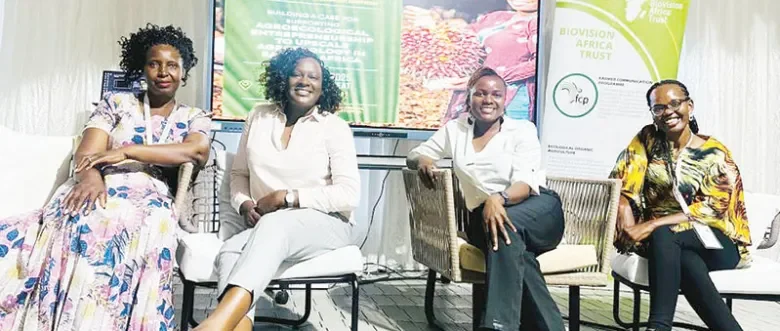How women-led innovations are changing the face of agriculture in Africa

By fusing traditional expertise with cutting-edge, environmentally friendly solutions, four visionary entrepreneurs from Zimbabwe and Uganda are revolutionizing the continent’s agricultural systems.
As MOURICE MUHOOZI reports from the just finished Eastern Africa Agroecology Conference in Nairobi, their endeavors redefine success by incorporating socioeconomic reform, youth employment, and biodiversity protection into its very foundation.
A unique subset of small and medium-sized businesses (SMEs) that defy the traditional business model is growing as the worldwide wave of SMEs grows: SMEs driven by agroecology. They are tackling environmental and economic concerns simultaneously by implementing cutting-edge agroecological techniques, demonstrating that sustainability can be a potent growth engine.
With the help of the Alliance for Food Sovereignty in Africa (AFSA) and other key partners, these progressive companies are proving that balancing environment and business is the way to a resilient future.
Bob George Sande, the Agriculture ministry’s chief agricultural official in charge of food security, promoted investment in agroecology-based businesses during the recent second Eastern Africa Agroecology Conference in Nairobi, Kenya, on March 25, 2025. He encouraged all stakeholders, especially the younger generation, to look beyond traditional frameworks and embrace businesses that could spur job creation and slow the loss of biodiversity throughout the continent during a discussion focused on fostering agroecological entrepreneurship to scale up agroecology in East Africa.
“This is about synthetics. What are the alternatives? Are the options we’re offering sufficient? I believe it’s time to scale up research and innovation,” Sande emphasized.
“We must come together and invest more in research and innovation to find sustainable solutions.” Andrew Adem, the Food Systems Coordinator at Alliance for Food Sovereignty in Africa (AFSA), echoed these sentiments, stating, “Supporting entrepreneurs is crucial for building a market where the food produced by the farmers we support can reach consumers who recognize it and choose it. This is why AFSA, alongside various partner organizations, is focused on fostering agroecological markets and businesses. Each of us, from different sectors, must come together to advocate for agroecological enterprises and create the conditions for their growth.”
Pioneering the Change with Innovators
A number of progressive pioneers were honored for transforming the continent’s farming systems by fusing traditional wisdom with cutting-edge, environmentally friendly solutions.

JULIET KANYESIGYE: Transforming dairy goat farming in Uganda
Kanyesigye’s dairy farm, Kanyes, is revolutionizing sustainable farming. With more than 30 goats, Kanyesigye’s farm was established in 2018 and each one is essential to her creative agroecological method.
She concentrates on producing dairy goats for milk production and cosmetics items through her farm, which benefits the environment and people alike.
Kanyesigye clarified, “Our objective is not only to produce milk, but to offer a wholesome and easily accessible substitute for individuals with particular health requirements.”
In addition to yogurt and ice cream, the milk produced on her farm is used to make a range of health-conscious items, such as body lotions, goat milk soap, and organic fertilizers.
People with allergies, weakened immune systems, or those in need of specific nutrition—like cancer patients or expectant mothers—benefit greatly from these items. From a little farm, her company has expanded swiftly to become a flourishing social venture with promising futures.
ZORORO TARUVINGA: Bridging culinary arts and agroecology in Zimbabwe
Taruvinga’s love of food and her desire to promote sustainable farming methods led her to pursue agroecology. Taruvinga, a culinary arts chef by training, founded ZoroNeMugoti Investments with the intention of creating scrumptious, wholesome meals using organic, locally sourced horticulture vegetables.
She purchases yams, tamarind, and wild berries from local farmers and turns them into drinks, snacks, and other goods with additional value.
The pleasure of food, in my opinion, lies not just in flavor but also in the emotional bond it fosters, Taruvinga said.
Her emphasis on native crops, including yams, shows a greater understanding of regional culinary traditions.
“When I was working outside Zimbabwe, I missed foods like yams. Being able to have them all year round brought me back to my roots,” She recalled.
By giving small farmers access to markets, her company has grown to be an essential link in the food value chain. Her company now sources from farmers who were once engaged in subsistence farming, turning them into small-scale business owners.
GERTRUDE CHAMBATI: Revitalizing indigenous food systems in Zimbabwe
Through her company, Majestic Africa PVT Limited, Chambati is promoting indigenous food systems. Chambati, a fervent supporter of agroecology, focuses his efforts on processing native fruits and tiny grains, which have long been a vital component of the local diet.
She became passionate about these foods after realizing how sustainable and healthful traditional farming methods were.
“Our mothers and grandmothers had strong yields and lived healthier lives because they ate foods that were in harmony with nature,” Chambati explained.
By processing native fruits and small grains like sorghum and millet, Chambati is not only conserving these foods but also emphasizing their value for both environmental sustainability and human health.
RITA NAGUDI: Herbal teas as a pathway to health and sustainability
With its innovative product line of Pumzi blended herbal teas, Nagudi’s business, Kipeeke Solutions Limited, is causing a stir in Uganda’s agroecological scene.
A carefully chosen combination of herbs, spices, fruits, and flowers—all chosen for their health benefits—are used to make these teas. Nagudi’s business provides customers with a quick, health-conscious substitute for conventional teas by combining the potent therapeutic qualities of organic ingredients like lemon, orange, and ginger.
“Without having to deal with finding individual ingredients, we wanted to make it easier for people to get the health benefits of herbs,” Nagudi said.
In 2020, it began as a backyard effort and has since expanded into a successful business that serves both large commercial crops and small-scale farmers.
She said, “We’re collaborating with farmers to incorporate these herbs into their farms so they can make money even when their cash crops aren’t in season.”
In addition to their medicinal properties, these herbs improve soil health by boosting nitrogen levels and enhancing moisture retention.
Risk of Failure to Scale
The road to developing agroecological businesses is not without its obstacles, despite the success stories that are popping up all over Africa. According to Thomas Obiero Were, director of Program and Enterprise Development at Agile Consulting Limited, these companies’ ability to grow depends on their ability to obtain funding, favorable laws, and institutional support.
Despite being in a strong position to innovate, agroecological SMEs must overcome obstacles such restricted access to funding, regulatory hurdles, and a lack of technical support in order to scale.
“Good ideas are not enough for these businesses,” Obiero stated.
“They require a favorable environment to flourish—one that offers the appropriate regulations, funding, and infrastructure to facilitate expansion.”
Africa has the chance to take the lead globally in changing its agricultural structures. The continent can create an economically viable, ecologically balanced, and socially just future by implementing agroecological advances and assisting these visionary businesspeople.







